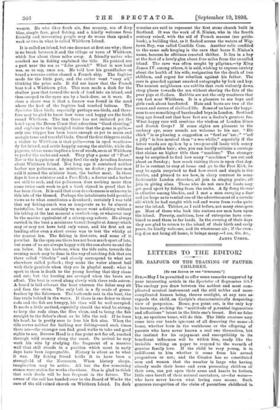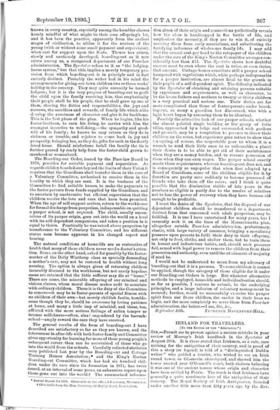LETTERS TO THE EDITOR:
MR. BALFOUR ON THE TRAINING OF PAUPER, CHILDREN.
110 TEM EDITOR 07 TER " SPECTATOR:9
Sin,—May I be permitted to offer some remarks suggested by your interesting article in the Spectator of September 5th P The analogy you draw between the noblest and most com- plicated musical instrument and the still nobler and more- complicated human being, throws sunlight, at any rate se- regards the child, on Carlyle's characteristically despairing. view of pauperism. Home, you point out, is the only key to harmony, evoking the "multitude of potential ingenuitiee- and affections" latent in the little one's breast, But no falser key, no spurious home, will do this. The little creature may. come into our hands ignorant of all deserving the name of., home, whether born in the workhouse or the offspring 9f parents who have never known a real one themselves, but the instinct for its enjoyment and susceptibility to its beneficent influences will be within him, ready like the invisible writing on paper to respond to the warmth of genuine family love. If the child be very young, it is, indifferent to him whether it come from his actual progenitors or not; and the Creator has so constituted men and women that the number is large who having. already made their home and even possessing children of= their own, can yet open their arms and hearts to forlorn, little ones bereft of their natural caretakers, or—far worse—, who have never known what loving care means. Such. generogo recognition of the claim of parentless childhood in 'known in every country, especially among the humbler classes keenly mindful of what might be their own offspring's lot, and it has been the practice, apparently from the earliest stages of civilisation, to utilise it for the nurture of the young (with or without some small payment and supervision), when cast for support upon the State. Thence has arisen, slowly and cautiously developed, boarding-out as it now exists among us, a recognised department of our Poor-law administration. The Spectator refers to it as "the lodging- -house system," but that title implies a merely temporary pro- vision from which boarding-out is in principle and in fact entirely distinct. Probably the writer had in his mind the arrangements for giving our town children two or three weeks' .holiday in the country. They may quite correctly be termed lodgers ; but it is the very purpose of boarding-out to graft the child upon the family receiving him, that emphatically their people shall be his people, that he shall grow up one of them, sharing the duties and responsibilities, the joys and sorrows, the sacrifices and rewards, of family life which alike -develop the sweetness of character and give it its backbone. This is the first phase of the plan. When he begins, like his foster-brethren, to earn his living, he carries with him the strongest incentive to well-doing,—the sympathy and good- will of his family ; he knows he may return as they do in sickness or trouble, and rejoices to come back in joy and .prosperity, bringing too, as they do, gifts for each in the dearly loved home. Should misfortune befall the family the tie is -further proved by ready help from the foster-child grown to ananhood or womanhood.
The Boarding-out Order, issued by the Poor-law Board in 1870, provides for suitable payment and supervision. As :regards childen boarded-out beyond the limits of their Union it requires that the Guardians shall transfer them to the care of a Voluntary Committee, authorised to receive them in the locality to which they are sent. It is the business of the :Committee to find suitable homes, to make the payments to the foster-parents from funds supplied by the Guardians, and to ascertain by unobtrusive but efficient supervision that the -children receive the love and care that have been promised. When the age of self-support arrives, return to the workhouse for formal discharge from pauperism, indispensable on quitting -a. pauper school, is not required. The child, usually uncon- scious of its pauper origin, goes out into the world on a level with its self-dependent companions, and takes a position in it equal to theirs. Practically he was raised above pauperism by transference to the Voluntary Committee, and his different :status soon became apparent in his changed aspect and -bearing.
The natural conditions of home-life are so restorative of -health that many of these children never need a doctor's atten- tion. Some, on the other hand, asked for possibly by the foster- -mother of the Dolly Winthrop class as specially demanding -a mother's care, may not be restored to health without long nursing. The option is always given of returning children incurably diseased to the workhouse, but not rarely hopeless -cases are retained that the little sufferer may die at "home." There are some, the miserable offspring of our criminal and 'vicious classes, whom moral disease makes unfit to associate -with ordinary children. These it is the duty of the Committee to remove—it may be to foster-parents of special fitness with no children of their own—but merely childish faults, trouble- some though they be, should be overcome by loving patience at home, and many a little imp of mischief, and those, too, -afflicted with the more serious failings of sullen temper or intense selfishness—often, alas ! engendered by the barrack- school—amply reward the care they have received.
The general results of the form of boarding-out I have -described are satisfactory so far as they are known, and the intercourse in after-life with both foster-family and Committee gives opportunity for learning far more of these young people's subsequent career-than can be ascertained of those who go into the world from the-schools. Carefully collected statistics were published last year by the Boarding-out and Cottage 'Training Homes Association ;* and the King's Norton Boarding-out Committee, which has had six hundred chil- dren under its care since its formation in 1871, has twice (issued, at an interval of some years, an exhaustive report upon those gone out into the world.i- The summarised informa- • Annual Report for 1895. Obtalualte at the office, 4 Sanctuary, Wettminsttr. t Obla'nable from the Eon. Secretary, 62 Itag!'ey Read, Di, ninlbam. tion given of their origin and connections pathetically reveals how the class is handicapped in the battle of life, and emphasises the necessity, if they are to win it, of entirely severing them from early associations, and substituting the fortifying influences of wholesome family life. I may add that the annual cost per head to the ratepayer of the children under the care of the King's Norton Committee averages con- siderably less than Ell. The Spectator shows how doubtful success must be even where the cost is twice, or even thrice, that amount. Cottage-homes constitute still a pauper school hampered with regulations which, while perhaps indispensable for a pauper institution, are almost fatal to the growth in their pupils of a self-dependent spirit. The difficulty indicated by the Spectator of obtaining and retaining persons suitable by experience and acquirements, as well as character, to be the house fathers and mothers to twenty or thirty children is a very practical and serious one. Their duties are far more complicated than those of foster-parents under board- ing-out, as many a guardian has discovered, who with a light heart began by assuming them to be identical.
Possibly the attractive look of our pauper schools, whether the almost palatial single building or the group of little villas, approached by a lodge and surrounded with gardens and grounds, may be a temptation to parents to throw their children on the rates, but experience goes rather to show that (excepting, of course, the respectable poor to whom it is a wrench to send their little ones to so unhomelike a place) their desire is to be able to get rid of their maintenance when they are a money burden, and to resume possession of them when they can earn wages. The pauper school exactly meets those requirements, whereas boarding-out does not, and is consequently so unpopular that when first adopted by a Board of Guardians, some of the children eligible for it by desertion are pretty sure suddenly to become possessed of friends who take them off the rates ; and I think it quite possible that the diminution visible of late years in the numbers so eligible is partly due to the resolve of relatives not to lose the power of recovery when they have become old enough to be profitable.
I trust the desire of the Spectator, that the disposal of our dependent children should be transferred to a department distinct from that concerned with adult pauperism, may be fulfilled. It is one I have entertained for many years, but I earnestly seek it on the lines of the Massachusetts plan, altogether outside Poor-law administration, probationary, elastic, with large variety of resource, bringing a moralising pressure upon parents to fulfil their duty to their offspring, not only to feed, clothe, and shelter them, but to train them in honest and industrious habits, and, should such pressure fail, armed with legal power to remove the children from their possession and authority, even until the attainment of majority if need be.
I would not be understood to mean from my advocacy of boarding-out that it is a panacea. To some children it cannot be applied, though the category of those eligible for it under our Boarding-out Orders is large. But whatever alternative methods be employed, home-life and individualisation should, as far as possible, I venture to submit, be the underlying principles, and a large infusion of voluntary management be secured ; further, would we successfully exorcise the pauper spirit from our State children, the earlier in their lives we begin, and the more completely we sever them from Poor-law administration, the better.—I am, Sir, &c.,
September 10th. FL'IRENCE DAVENPORT-HILL.



































 Previous page
Previous page